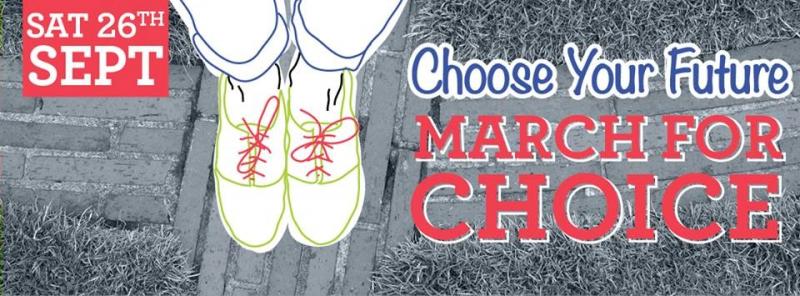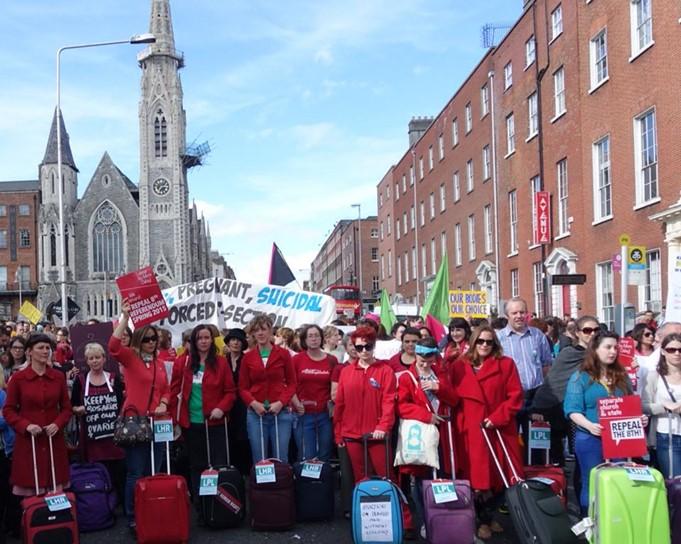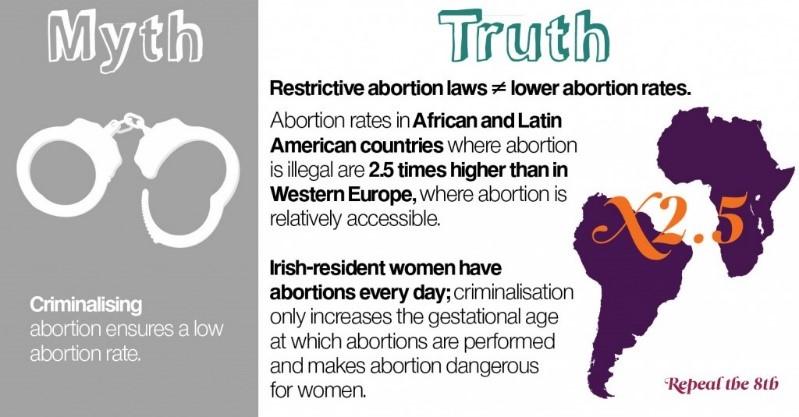En Irlande, le « silence est rompu » : La Campagne pour le droit à l’avortement
Abortion Rights Campaign (ARC – Campagne pour le droit à l’avortement) – qui milite pour que l’avortement devienne gratuit, sûr et légal en Irlande – est membre de l’AWID depuis le mois de mai 2015. Cette organisation de base, non hiérarchique et entièrement composée de bénévoles mène son action en faveur de l’avortement en toute indépendance.
Elle collabore avec de nombreux groupes de défense de la justice sociale, des droits humains et de l’égalité de genre qui, tous, travaillent sur des thèmes liés à l’incapacité de l’Irlande à garantir pleinement la santé et les droits sexuels et reproductifs (SDSR) des femmes, notamment depuis l’adoption en 1983 du 8e amendement de la Constitution irlandaise. L’ARC n’existe que depuis janvier 2013, mais elle collabore déjà activement avec plus de 15 organisations basées dans toute l’Irlande ou d’envergure internationale, parmi lesquelles des conseils de femmes, des groupes de défense des droits des personnes transgenres, des migrant-e-s, des gens du voyage mais aussi des organisations régionales / rurales.

Marcher pour le droit de choisir
Dans le cadre de la Journée mondiale d’action pour l’accès à l’avortement sûr et légal, l’ARC a organisé sa 4e Marche annuelle pour l’avortement (site en anglais) le 26 septembre. Cette marche est une partie intégrante de la mission de l’ARC, une mission qui consiste d’une part à lutter pour que les femmes puissent avorter légalement, gratuitement et en toute sécurité et, d’autre part, à remettre en cause le contexte restrictif, stigmatisant et patriarcal dans lequel la SDSR est mise en œuvre en Irlande.
Selon Cathie Doherty, l’une des co-organisatrices de l’ARC, « l’Irlande aspire actuellement à un vrai changement, contrairement à ce que prétendent le ministre de la Santé et le Premier ministre. Nous devons cesser de prétendre que les femmes irlandaises ne vont pas à l’étranger pour avorter. Cette hypocrisie contraint les femmes qui ne peuvent pas adopter cette solution à mener à leur terme des grossesses non désirées ou à importer illégalement des pilules abortives. Nous pouvons faire évoluer l’Irlande. Nous pouvons également vivre dans une société qui nous traite comme les êtres humains estimables que nous sommes.»

En un an tout juste (entre 2013 et 2014), le nombre de participant-e-s à la marche est passé de 1 000 à 5 000. Ce sont 10 000 participant-e-s qui ont été comptabilisés à la marche de cette année. Les manifestant-e-s sont venu-e-s avec des valises à roulettes pour symboliser l’obligation faite aux femmes d’aller avorter hors du pays. Entre janvier 1980 et décembre 2014, au moins 163 514 femmes et jeunes filles ont dû quitter le territoire irlandais pour bénéficier de services médicalisés d’interruption de grossesse à l’étranger (site en anglais).
Prendre la parole pour rompre le silence et mettre fin à la stigmatisation
L’ARC collabore étroitement avec de nombreuses femmes qui ont avorté, et ce dans le but de faire connaître leur histoire. Elle met à leur disposition un espace sûr au sein duquel elles peuvent parler et être écoutées. Des séances de prise de parole (« Speak-out ») ont été organisées en 2013 puis en 2014, dans le but d’offrir à ces femmes la possibilité de parler de l’avortement ou des soins de médecine procréative dont elles ont pu bénéficier à l’étranger ou, illégalement, en Irlande.
Certaines des participantes ont confié leur témoignage à des journalistes. L’écrivaine et comédienne Tara Flynn a récemment évoqué sa propre expérience dans un article de l’Irish Times (site en anglais). Elle a notamment affirmé qu’elle participerait à la Marche pour le droit de choisir, poursuivant en ces termes : « il est temps de reconnaître le vécu réel de toutes ces femmes – que nous connaissons – et d’admettre les faits tels qu’ils sont : des centaines de milliers de femmes ont été contraintes de prendre des risques ou d’aller à l’étranger pour recevoir les soins de santé dont elles avaient besoin. Le silence ne nous a mené à rien. Il est temps de parler. »
Mettre à bas les mythes grâce aux médias sociaux

L’ARC considère les médias sociaux comme une plateforme efficace pour mener son action et mettre en lumière les questions relatives à l’autonomie corporelle, un sujet que les médias traditionnels n’abordent généralement pas.
« Pour atteindre le public le plus large possible, nous [l’ARC] nous efforçons d’intégrer l’utilisation des nouveaux médias et des nouvelles technologies à tous les niveaux de notre travail de plaidoyer. »
En préparation de la Journée internationale des femmes 2014, l’ARC a mené la campagne « 8 days, 8 myths » (« 8 jours, 8 mythes »), dans le but de saper les fondements de la stigmatisation et des préjugés dont sont victimes les femmes qui avortent.
Présentation de la 4e Marche annuelle pour le droit de choisir (en anglais)
